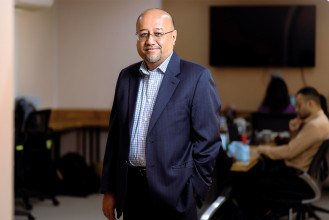
RAJESH KUMAR AGRAWAL
Director, RMC
Senior Vice President, CNI
What started as a small trading business dealing in hardware has now grown to become one of the leading business houses of the country with verticals in steel and iron manufacturing, cement production, banking and insurance, and also the food industry. “We had a small trading business called Rajesh Hardware in Teku when I first joined my father’s business in 1987,” says Rajesh Kumar Agrawal, Director of RMC and Senior Vice President of the Confederation of Nepalese Industries (CNI). He adds it was later in 1995 after the partners in his father’s business decided to go their separate ways that they decided to get into manufacturing and established Rajesh Metal Crafts. Agrawal shares that the family business was started on a very small scale. “My father had immense business knowledge but we were not a big business that I could say I was carrying forward the family legacy,” he candidly says, adding that it has been a journey of struggles. “There will always be ups and down when one starts any business but there are three things – truth, sincerity and integrity – that one must never forget if they want to be successful,” Agrawal states. “I think these three fundamental characters are required not just to become a successful business person but also a good human being,” he adds. In this edition of Business 360, we caught up with Agrawal, who is set to become the president of CNI during its 20th annual general meeting in June, to get insight into what it is like to be in business in the current times and his views on the economy. Excerpts:
You have been involved in business since a very young age. What were the initial challenges when you started out?
When I first joined my father to help him in his business, the banking sector was not as vibrant as it is today. It was really difficult to avail loans from banks as there were hardly any private banks with just Nabil Bank and Himalayan Bank among a couple others. Moreover, the banks were very conservative back then and would provide only collateral-based loans. Initially, we had a very small budget so we decided to stick to the trading business as setting up a manufacturing plant is financially intensive. We had to actually borrow from some close friends in the beginning. Back then, you could have a fantastic business idea but it would be next to impossible to work on the idea due to constraints in availing finance. We did have many business ideas but we stuck to trading as we didn’t have the required funds and access to banks was nearly nil. There actually was no trend to approach banks for business loans like how it is at the moment. My father urged us to approach banks for loans if we wanted to expand our business. He told us the only thing the banks could do is to refuse our proposal. In the days to come, the banking sector also grew and we could think of materialising our business ideas. Financing was a problem faced by many who wanted to set up industries then. The other major problem was in obtaining a licence to start a manufacturing plant. These were the two main challenges then.How do you view the country’s economy in the current context?
If you look at the country’s economy cumulatively, then I would say it has grown. In the early 1990s after the advent of democracy in the country the subsequent governments started reforming the economy. The reforms that were taken had a very positive impact. So, if you compare the economy at the moment to what it was prior to democracy, then I would say we have improved though it has been slow when compared to other countries that started the economic liberalisation process then. But we also have limitations. We are a landlocked country and we have to import basically everything. We do not have proper infrastructure and to develop infrastructure we do not have enough resources. So, if you take these into consideration, I would say we have had quite a good growth. However, the biggest impediment to our economy is our political situation. From the time we have had democracy we have not had a government that has lasted for a full five-year term. This hampers the economy a lot because there will always be policy inconsistency when there is frequent change in government. Definitely, we have not been able to realise the growth we could have achieved but overall, I would think it is quite good.What are the current major challenges for the economy?
We have to go back in time a little bit. We have to start talking about the time when we had the earthquake in 2015. It was a big shock for us at the time, however we gradually came out of that shock and everything was recovering and we received foreign aid too. After the quake, the infrastructure sector grew quite well and there was a sort of boom in the economy. There was growth in the number of industries too with the cement and steel industries seeing significant growth, for example. Our economic growth was on a positive trajectory and then we had the Covid 19 pandemic which nobody had even thought about. But we were able to come out of this problem gradually as the government then took some prudent steps based on suggestions that not only CNI but other private sector organisations provided. We were hopeful that the economy would now be back on track and then we had the Russia-Ukraine conflict. As soon as this conflict started everybody began to panic because Ukraine is the food supplier of the world. Due to this conflict, the prices of commodities have risen tremendously. We are in a bit of a problem right now because all our efforts in the past few years have gone into managing the various shocks that we have been facing time and again since the earthquake. Some time back, we started facing pressure on our foreign currency reserves and Nepal Rastra Bank took some measures to take stock of the situation. However, what happened with these measures is that definitely the foreign currency reserves shored up but it hurt our domestic economy as demand went down. Moreover, credit interest rates started rising substantially. That is why, at the moment, the situation is such, our external sector became strong but our internal sector went down tremendously. There was a need to have balanced the two sectors and moved ahead accordingly. May be at that time looking at the economic situation of Sri Lanka, we took a knee-jerk reaction and adopted extreme steps. Now that has created a lot of challenges in the internal sector.We are officially in a recession right now. What, according to you, are the concrete ways we could come out of this situation?
The biggest problem at the moment I would say is that the government has adopted a bit of contractionary policies and it has limited lending too. As a result, demand has drastically reduced. The issue right now is that there is no demand in the market and cost has gone up in terms of interest. So, the situation is such that income has gone down but expenses have risen. Due to this, the public do not have disposable money in their hands. If people do not have enough money to spend then subsequently there will be no demand in the market. At present, the situation is such that there is hardly any customer in New Road, which is supposed to be the main shopping hub of not only Kathmandu but the country. A shop that used to previously conduct business worth around Rs 40,000 on a daily basis does not have business worth even Rs 10,000 at present. The government has been focused on decreasing loans but what it should realise is that loans go to people who will spend it in the market whether it is for asset creation or for consumption. But now loans are few and far between and people do not have the funds to spend. The solution to this would be to increase the flow of funds in the market. Economic activities have to be given a boost, for instance, real estate business is totally nil at the moment. There is restriction on lending to real estate business but this is a sector that could help money flow in the market. There are many restrictions in the share market too. I have still not been able to fathom why the government considers investment in the share market as unproductive. A share market can never be unproductive, it is a medium to raise funds. The more vibrant it is, the better it is for the economy. As an industrialist, it is difficult for me to obtain loans because the interest rates are high but if the share market is vibrant, I can raise funds from the capital market. And I will not be concerned about the interest rates. So, I would say there is a need for a vibrant share market in Nepal. If we could give a lift to some sectors then funds will start rotating in the market and the government needs to look into this factor. If I have money, I will buy what I need from you and you will then buy something you need from somebody else; that is how funds flow in the market. And when funds start flowing in the market then there will be demand creation. So, the main reason why we are in a recession is that funds are not flowing within the system.
Experts say that shortage of funds in the market is also due to the government not being able to increase its capital expenditure. What are your views?
Capital expenditure is definitely one factor. When the government spends the development budget, it will boost the flow of money in the system but at the moment, the central bank’s policy seems to be in curtailing new loans. Loans are so expensive that the public does not have the confidence to avail credit. As per recent data, deposits in the banking sector have increased by the billions but lending has increased by only about 4%, whereas last year increment in lending stood at 13.5%. So, if there has been an increase in lending by only around 4% then it means that money is not flowing into people’s hands. That is one major factor why there is less money in the market. NRB tried to restrict lending and it has been successful in doing so. The second factor definitely is capital expenditure or the lack of it. When the government spends its development budget there will always be two simultaneous benefits. The first is we will have proper infrastructure and we get the returns of that infrastructure for many years to come. And when we start developing infrastructure then related industries also start getting business whether it be sand or cement or any other related industry for that matter. Even the heavy equipment industry is mobilised and fuel is consumed. A lot of labour is also utilised and electricity too is consumed. A lot of things get consumed when we develop infrastructure projects. I think it is the largest employer of goods and services. When we first invest in infrastructure, we have to be mindful that we will not get returns immediately but over the long term there are tremendous benefits. However, even while building infrastructure we have to be careful about where we invest the money. For instance, look at the two international airports we built; we made the investment but getting back returns is very difficult. We have to do an analysis before we invest in certain types of infrastructure. However, there are some infrastructure projects like building roads and bridges where we do not have to think too much while investing. Or maybe if you want to convert the four-lane East-West highway into six lanes or the Kathmandu-Nijgadh Fast Track, which has been delayed. Such infrastructure should be developed in a timely manner. The moment such infrastructure is built then cost and time of transportation are saved. Moreover, fuel consumption will also drop and we will have to import less amount of petroleum products. The other infrastructure that is in the pipeline is the Raxaul-Kathmandu electric railway for which the DPR has already been prepared. Definitely a lot of investment will be required for that project but there are so many inherent benefits of it. We can’t even imagine how much it will help in bringing down the cost of transporting goods to Kathmandu. Moreover, it is electric and we have enough hydropower. So, we should look at such types of benefits and invest in infrastructure projects.Are you satisfied with the latest Monetary Policy?
The good thing about the policy is that the central bank is focusing on fiscal stability. It is focusing on the health of the banks, the quality of loans being disbursed by the banking sector. This is the duty of the central bank, so don’t take it otherwise. But I feel the economic impact should be taken into consideration whenever any policy is drafted. During Covid 19, literally all businesses faced a hard time and after coming out of the pandemic we increased the flow of money in the market. We loosened many provisions to boost the economy and now many are saying that we loosened up too much at that time. But now is not the time to harp on what happened then because we did what we thought was good for the economy at that time. It is necessary to tighten that now and unwind some measures but the crucial factor is at what speed we should have done that. The government should have tightened policies gradually. The problem is we tried to tighten everything at once. For two years we adopted expansionary policy and when we try to tighten everything within three to four months then we will definitely start facing problems. The expansionary policy was for two years, so we should bring that into contraction in a similar time period. That is the major issue I see now.How do you define a startup and what areas of business would you advice startups to get into?
Don’t take me otherwise but startups have become a new fad now. The first thing is we need clarity on what a startup is. I think people should research and study what a startup is. Secondly, they should look at the viability of that business; is it required in Nepal? What is the point in launching a startup when there is no need for it in the market? The third aspect, one has to focus on is how much can they scale up the business. The private sector is working to help startups and we do have incubation centres. I think it is necessary to develop this culture. In fact, CNI also conducted a Startup Fest and we recently tied up with an Indian company and started an incubation centre. We identified 10 startups through the incubation centre and we are working with them now. I think within six months we will see results. I feel the ecosystem for startups has not yet been fully developed in Nepal. One good aspect is private equity has also started in Nepal. Things have begun from the private sector level but I feel the systematic way in which an ecosystem should be developed is lacking. The government too has a big role in developing startups. We are holding talks with the government on how we could take this forward. Recently, we spoke to the government and discussed on whether we could replicate the model that the Indian government has adopted or make some amendments to India’s policy to suit our requirements and start something here. Work is going on but it will take a little time for that to come to fruition. To be very honest, I am also not very clear on what to call a startup. What is happening at the moment is even if I open a manufacturing plant it is called a startup. How can that be a startup? A startup I feel is a new idea which will fulfil the needs of the public. For example, Foodmandu definitely was a startup, it started something totally new. And even Pathao, though it has come from outside, is a startup. It has helped people move around on budget. People who cannot afford taxis and don’t want to travel in crowded public transportation and also need to reach various places quickly are using Pathao. Such new ideas which cater to the needs of the public, I would say, can be defined as a startup.The country’s trade deficit is ballooning. What measures could be taken to reduce this deficit?
The one way that we can reduce our trade deficit definitely would be to increase our exports but we need to focus on where our strength lies. When people can afford they will start consuming and when there is demand, businesses will import goods if they are not available here. Those who can afford will even travel abroad to buy what they need if it is not available in the country. So, we have to look at our strengths. Right now, there is so much talk about electricity, if we can fully develop that sector and export electricity it will help a lot in reducing the trade deficit and this is a long-term business too. When we develop hydropower projects there is a one-time investment and after that it is only about returns. The one product that we have not explored at all is herbs and aromatic plants. Till date we have not started proper commercial farming of those products. If we start commercial farming of such plants and then process them and export, I think it will boost our exports. Tourism is also another sector we should look into. Even though we cannot export anything in tourism but we can earn foreign currency. Let us not look at trade deficit in such a way that we calculate only the goods we import and export. Let us look at it in a way whereby we calculate how much foreign currency we use to import and how much foreign currency we earn. Let us look at trade deficit in that way too. That is why tourism could be one fantastic way to reduce that deficit. One other way is to increase production in the country and the government should provide ample support for this. When we increase production then maybe we will not be able to export a lot of what we have manufactured but it will help reduce imports. This is basically import substitution. For that we need government support and a bit of protection too. Also, there are many products being manufactured in the country but we are not aware of it. For instance, it was only recently I got to know that we produce talcum powder and even lipsticks. However, such businesses are on a small scale and there is no marketing and promotion of such products. It is not that things cannot be done here, there are many who are doing fantastic things. It may be because they have not been promoted, we don’t know about such products. I would also like to touch upon another factor which relates to our mindset. Oftentimes, most of us believe that goods manufactured abroad are of a better quality than domestically produced goods. That is also one reason why we import so much even though there are companies here manufacturing quality products. Maybe even I am not using Nepali products because I am not aware of them. So, promoting small industries is also crucial. One of the aims of the Make in Nepal – Swadeshi campaign that CNI has launched is also for this. We want to make people aware that products made by Nepali companies are of a good quality. It is not that we cannot produce quality products, it is just that local brands are not being promoted.The country has become self-reliant in cement, what other goods can be identified where we can be self-reliant?
With cement, the thing is we had the required raw materials and the only necessity was to tap into that. The government also provided a lot of support. There is a list we have on the products we could be self-sufficient in. Just recently, six companies have announced they will start manufacturing tiles in the country. Some of them will be bringing in foreign investment too. These companies have said they will be using 40% domestic raw materials initially and in the next two years they will try to use 100% local raw materials. They have already started research to that end. So, we could be self-sufficient in tiles soon. Around three years back the government banned the import of energy drinks and some local business people saw an opportunity there and now we are self-sufficient in it and they are producing quality drinks. There are many products where I think we could be self-sufficient. Shoes is another such product. We produce quality shoes in Nepal but our mindset is that only foreign brands are good. And when domestic industries flourish, they also help generate employment opportunities.How can we improve domestic and foreign investment in the country and any suggestions to the government for the upcoming budget?
Prior to foreign investment, I think we should first focus on domestic investment. One of the biggest hurdles to attracting investments, be it domestic or foreign, is the lack in policy consistency. To establish any industry, we require policy consistency from the government. When a person is involved in the trading sector then it might not make much of a difference; you can sell your goods within a couple of months and close down. However, setting up manufacturing plants is a long-term investment and it involves millions or at times billions of rupees. Once an investor sets up an industry, they should be made to feel confident that they will be able to run that industry for the next 20 to 25 years without having to go through major policy changes. Regarding the budget, the major suggestion that we have been providing the government is it should make major investments in infrastructure projects. When we start building infrastructure then its spillover effects touch practically every sector. Not only the infrastructure but the money that is spent building the infrastructure will also have a positive spillover effect. The government should reduce its recurrent expenditure and lay emphasis on capital expenditure. The other suggestion we have given to the government is to provide some form of protection to local industries.How has the experience with CNI been and as its Senior Vice President what are your major agendas for the organisation and the overall economy?
CNI was established around 20 years back and I have been associated with it for the last 16 years. Initially, I was a national council member and later headed various committees and then went on to be the vice president for two terms. At present, I am the senior vice president. Being with CNI has been a learning experience. It has helped me grow as a person and helped me enhance my knowledge. Otherwise, I might have been involved in only one industry and my knowledge could have been limited to that particular business. After joining CNI, I got a broader view and started understanding the nitty-gritty of the economy. For instance, now if someone talks about the need to reduce interest rates, I know whether or not it will be beneficial for the economy. I have also been able to develop my relations in the government sector. I have seen the organisation grow, and have myself grown along with it. CNI has reached a certain respectable level which can be ascertained by the manner in which the government views the organisation and takes its suggestions. We try to act as advisors to the government on economic policies. Even during Covid, the government followed many of our suggestions and Nepal Rastra Bank implemented various policies. We have established a research cell at CNI and as a result, we are able to provide data-based suggestions to the government. My plan is to further strengthen our secretariat and the research cell so that we can collect more data and I want to work based on that data. I also want to enhance the capacity of the staff at our secretariat so that we can develop ourselves as a think tank to the government. We are providing feedback and suggestions to the government but I want to make it stronger. While talking about the economy, I think CNI was the first to talk about double-digit growth. We want to see the type of growth that our two neighbours have witnessed or even countries like Vietnam which was in the same position like us a few years back but have leapfrogged. We, at CNI, are working towards that goal and we are doing a lot of research. We are also working on changing a lot of laws. There are many laws that were drafted more than 50 years ago and they have become irrelevant in the present context. It is time to amend many of them. And if you look at the laws closely you will notice that literally all have ‘Niyantran’ attached to their names. Niyantran means to control or restrain. This, somehow, suggests they have been drafted to control businesses. It would be a good start if we could change the names of the laws and have something that deals more with encouragement and guidelines. We are trying to transform the mindset of the bureaucracy from ‘controlling’ to ‘encouraging’. The government is positive towards that. Right now, we are facing economic hurdles due to political instability. A lot of things depend on political will, the will to start something. No matter what we do, CNI’s main focus is to have double-digit growth in Nepal.
CNI has also been holding various types of summits like the Infrastructure Summit and Investment Summit. How relevant do you think these are?
Such summits may not look relevant in the immediate future and you might not see any immediate tangible results too but it helps in creating awareness among people. We bring investors and experts from abroad and they get the opportunity to witness our country and our policies. So, these summits are basically held to start creating awareness. When we started the Infrastructure Summit, we did it at a small scale but now it has become a major event of the nation. We have called ministers from India and taken ideas from them and worked accordingly. When we hold the summit, we do a lot of research and make presentations which are also forwarded to the government and we follow up on that too. Due to those research, we now have a proper database. So, we know tentatively how much investment is required in the next 30 years and how to get that investment and from where. Yes, there will not be any immediate benefit but it helps a lot in the long term, it is a continuous effort. For instance, in the first summit there might just be awareness creation but in the second there could be a follow-up on the issues raised in the first one. So, when summits are held database is created and the government is also somehow impelled to address certain issues raised in the summits. Moreover, policy discussions are also held during the summits and the government becomes aware of what is lacking where. It is also an opportunity to learn for both the private sector players and the bureaucracy. The other aspect we have to always emphasise on is interaction with international chambers. After Covid, I have noticed we have been having very less interactions with institutions from abroad. We do have MoUs with international chambers but the number of interactions has gone down. So, we at CNI, are working on establishing an association of all the chambers within the SAARC region so that there is regular interaction. During this term, I have placed an agenda to have regular interactions with all the international chambers we have partnered with. At least the director generals of these chambers should interact on a monthly basis. We also want to have cross-visits of delegations so that we can learn more and also work on things that are mutually beneficial.The country has adopted a federal structure of governance but there are voices being raised now that it is not economically viable. What is your opinion?
I would not like to make comments on the political side of it. Even when you look at it from an economic perspective, it is a debatable topic. Personally, what I see is that when there is a federal structure there will be development work in specific regions. Otherwise, what could happen is that one area will develop while some other area could be left out when everything is centralised. When we have provinces then the provincial governments will be responsible for the development of their respective provinces. The second thing is funds will filter down to the local levels, hence the local regions will also develop. I myself have seen some nice local roads that have been constructed by the local governments. Yes, at the moment there might be a running cost involved. However, the development that will take place at the local level will be tremendous and expenses for development activities at the local levels are quite low. A local level government will know better what is required, whether it be a drainage or electricity poles or drinking water facility. Such types of investments were not being made previously in the centralised system for whatsoever reason. Development expenditure has percolated to the local levels and we will gradually see the results. The debate on whether it is economically viable or not has come up because our revenue base is not strong since we have an import-based revenue system. We now have to look at ways in which we can increase our revenue base, which means we have to focus on production and industrialisation. We have to focus on our strengths and one area I see is the information technology sector. We have educated manpower in our country who can speak good English so we could open call centres. Big companies are not bothered where their backend offices are located as long as they get the service. There is a lot of good work being done by IT companies in Nepal. We need to look at sectors where we are competitively better and can earn more revenues. We need to find more ways for the government to generate revenue. Once there is revenue then there will be no issue regarding capital expenditure or expenses at the provincial level or local level. This issue about the federal structure not being economically viable has cropped up because the government has less revenue.What are the current strengths and weaknesses of our economy?
The major two challenges are political instability and policy inconsistency. The third challenge I see is that it is time we changed our old laws. It has already become very late. Until we are able to overcome these fundamental challenges, I don’t think we will be able to move forward. While talking about our strength, from the very beginning we have been prudent in our activities. We must also appreciate the good measures that our bureaucracy has taken. We did not take a lot of foreign loans. Even now our internal and foreign loan is only around the 40% mark of the GDP. That is a big strength; as far as I know our bureaucracy has always focused on grants rather than taking loans. As a result, we are in a better position now as compared to the other SAARC countries like Bangladesh, Pakistan or Sri Lanka. We have other strengths too and the only issue is that we have not been able to cash in on them due to political instability. READ ALSO:
Published Date: June 6, 2023, 12:00 am
Post Comments
E-Magazine
RELATED In the Lead



-1767340083.jpg)
